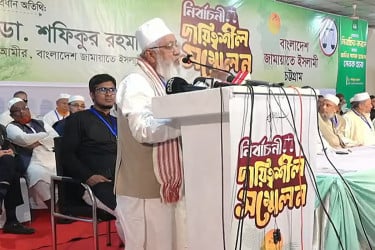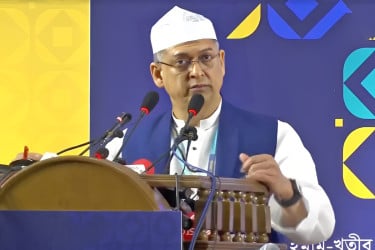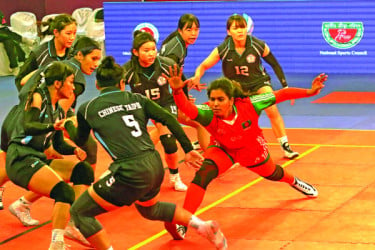সুপ্রিয় শিক্ষার্থীরা আজ আমরা English Grammar-এর গুরুত্বপূর্ণ বিষয় Completing Sentence নিয়ে আলোচনা করছি। Completing Sentence-এ এক বা একাধিক Suitable Word/Words দ্বারা পূর্ণ করতে হয়। Suitable Word/Words, Sentence-এর প্রদত্ত অংশের অর্থের সঙ্গে সঙ্গতিপূর্ণ হতে হবে।
Completing Sentence-এ একটি বা দুটি Suitablব Word দ্বারা পূর্ণ করতে হয়। Suitable Word বসানোর সময় Sentence-এর অর্থ এবং Sentence-এর Structure-এর দিকে লক্ষ্য রাখতে হয়।
SOME RULES OF COMPLETING SENTENCE
1. Too ..... to : Incomplete Sentence-এ Adjective/adverb-এর পূর্বে too থাকলে উক্ত incomplete sentence-এর শেষে to+সঙ্গতিপূর্ণ াবত্ন এবং এরপর অর্থবহ শব্দ বা শব্দ সমষ্টি বসে। যেমন :
i. The boy is — Ans. : The boy is too small to touch the roof.
Note : এখানে small adjective এবং এর পূর্বে too বসেছে এবং এর পরে াerb touch-এর পূর্বে to বসেছে এবং বাক্যটিতে adjective-এর পূর্বে ফাঁকা না থেকে াবত্ন এর পূর্বে ফাঁকা থাকতে পারে। যেমন :
Ans. : The boy is too small to touch the roof.
এক্ষেত্রে নিম্নের StructurewU জানা থাকলে যেখানেই ফাঁকা থাকনা কেন তা পূরণ করতে সহজ হবে।
Structure : Sub+verb+too+adj/adv+to একটি সঙ্গতিপূর্ণ বা অর্থপূর্ণ াবত্ন+বাকি অংশ।
২. So .......... that : Sentence-এ এতই যে এরূপ অর্থ প্রকাশ করলে ঝড় ........ that বসে। এক্ষেত্রে Incomplete sentencবটিতে ঝড় এর পরে adjective+cannot/could not+একটি অর্থপূর্ণ াerb+বাকি অংশ দ্বারা Sentence সম্পূর্ণ করতে হয়।
যেমন : The weather was —— Ans. The weather was so rough that they could not play.
Note : ‰LvGb adjective (rough)-এর পূর্বে ফাঁকা না থেকে verb play-‰র পূর্বে ফাঁকা থাকতে পারে। তখন এখানে Cannot/could noঃ বসাতে হবে। যেমন : The weather was so rough ———
Ans. : The weather was so rough that they could not play.
Note : can not/could not-‰ i যে কোনোটি tense-‰র ওপর নির্ভর করবে। বাক্যটির প্রথম অংশ Present tense হলে Can not বসবে। যেমন : The fog is so thick that we can not drive cars.
3. In complete sentence-এর শেষে So that/in order that থাকলে তারপর Subject এবং এরপর auxiliary verb can বা সধু বসে। প্রথম অংশ (clause) present tense হলে can/may এবং past tense হলে Could/might বসে। যেমন :
i. He reads more so that ———
Ans. He reads more so that he can make a good result.
ii. He worked hard so that ———
Ans. He worked hard so that he could prosper in life.
iii. We ran to the station in order that —
Ans. We ran to the station in order that we could catch the train.
4. Lest : Lest একটি Conjunction এবং এর অর্থ যাতে না ঘটে বা যাতে এরকম না হয়। lest দ্বারা যে clause আরম্ভ হয় তাতে no বা not বসে না। lest দ্বারা যে clause শুরু হয় তারপরে ংযড়ঁষফ/সরমযঃ বসে। যেমন :
1. He ran fast lest he ——
Ans. : He ran fast lest he should miss the train.
2. I was kind to her lest she ——
Ans. : I was kind to her lest she should go away.
5. In case : In case একটি Conjunction এবং এর অর্থ ‘যদি’ In case যুক্ত subordinate clausewU principal clause (sentence-‰র মূল অংশ)-এর কাজের কারণ নির্দেশ করে। যেমন :
1. He will carry an umbrella in case (যদি) it rains.
Note : In case-এর পর সাধারণত present tense ব্যবহূত হয়।
6. It is time/It is high time : কোনো কাজ করার সময় ইতিমধ্যেই অতিবাহিত হয়ে গেছে। সুতরাং আর বিলম্ব না করে এখনই কাজটি শুরু করা উচিত এরূপ বুঝালে It is time/It is high time-এর ব্যবহার হয়। যেমন :
1. It is time we ———
Ans. It is time we went home.
2. It is high time we ——
Ans. It is high time we changed our eating habits.
Note : It is time/It is high time-এর ci verb সাধারণত past tense হয়।
7. Let alone : কোনো কিছু ‘চিন্তা করা যায় না’ বা ‘ভাবা যায় না’ এরূপ অর্থ প্রকাশ করতে Let alone ব্যবহার করা হয়। এটা সাধারণত Negative অর্থ প্রকাশ করতে ব্যবহার করা হয়। (যেমন : সে দুই বেলা ভাত খেতে পারে না। তিন বেলা ভাতের কথা চিন্তা করা যায় না)
1. He can not pass in the third division —
Ans. He can not pass in the third division let alone first division.
2. He can not swim a kilo meter —— Ans. He can not swim a kilo meter let alone ten kilometers.
8. Unless : Unless অর্থ যদি না। তাই Unless দ্বারা যে clause শুরু হয় সে clause (বাক্যাংশ)-এ not বসে না বা ঘবমধঃরাব হয় না। Unless বাক্যের শুরুতে বসতে পারে আবার মাঝখানে বসতে পারে। যেমন :
1. Unless you read attentively you will fail. (যদি তুমি মনযোগ সহকারে পড়াশোনা না কর, তাহলে তুমি ফেল করবে)
2. You will miss the train unless you walk fast. (যদি তুমি দ্রুত না হাঁট, তা হলে ট্রেনটি মিস করবে)
9. Until/till : Till or until-এর পরের অংশ সাধারণত affirmative হয়।
1. Wait for me until I come back. (যতক্ষণ না আমি ফিরে আসি ততক্ষণ আমার জন্য অপেক্ষা কর)
2. I will nurse my mother till she comes round. (আমি আমার মাকে সেবা করব যতক্ষণ না সে সুস্থ হয়)
10. Even, not even, even though : Even অর্থ এমন কি, not even অর্থ এমনকি তাও নয় এবং Even though অর্থ হলো এমনকি যদিও। Sentence-এর সঙ্গে অর্থের সামঞ্জস্য করে এদের ব্যবহার করা হয়। যেমন :
1. Nobody would lend him the money not even his best friend. (কেউ তাকে টাকা ধার দিবে না, এমনকি তার ঘনিষ্ঠ বন্ধুরাও না)
2. Not even his best friend would help him now. (এমনকি তার ঘনিষ্ঠ বন্ধুরাও তাকে সাহায্য করবে না)
3. Even though he can not drive he has bought a car. (এমনকি যদিও সে গাড়ি চালাতে পারে না, সে একটি গাড়ি কিনিয়াছে)
11. Inspite of/despite : Inspite of/despite-এর অর্থ সত্ত্বেও। এ জাতীয় শব্দ দ্বারা Simple Sentence গঠিত হয়। Incomplete Sentence-‰ Inspite of, despite থাকলে এদের বিপরীত অর্থবোধক Sentence দ্বারা প্রদত্ত incomplete sentencewU Complete করতে হয়। যেমন :
1. Inspite of his poverty he is honest. (তার দারিদ্র্য থাকা সত্ত্বেও সে সৎ)
2. Inspite of his illness he went to college. (তার অসুস্থতা সত্ত্বেও সে কলেজে গিয়েছিল)
3. Despite his good qualification he did not get a suitable লড়ন. (তার ভালো যোগ্যতা থাকা সত্ত্বেও সে ভালো চাকরি পায়নি)
12. Instead of/In lieu of : Instead of, In lieu of-এর অর্থ পরিবর্তে। একটি জিনিস বা বিষয়ের পরিবর্তে অন্যটি নেওয়া বা পছন্দ বুঝাতে এর ব্যবহার হয়। Instead of বা In lieu of Sentence-এর শুরুতে বা মাঝখানে (অর্থানুসারে) বসে। যেমন :
1. Instead of tea he took coffee.
2. He ate fish in lieu of meat.
[চলবে]























































































